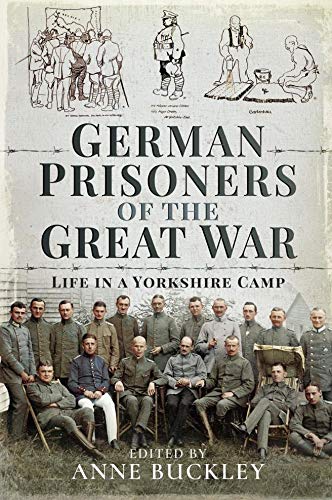
(This review appeared in the WFA’s Stand To! journal in late 2021.)
 German Prisoners of the Great War is the first English translation of the 1920 book Kriegsgefangen in Skipton, an edited volume of German officers’ experiences as prisoners of war (POW) during the Great War at Raikeswood Camp (as it was known locally) in Skipton, North Yorkshire. I have been looking forward to the publication of this book ever since I interviewed the editor, Anne Buckley, for the WFA’s weekly podcast, Mentioned in Dispatches (MiD), in the summer of 2018 (Episode 67).
German Prisoners of the Great War is the first English translation of the 1920 book Kriegsgefangen in Skipton, an edited volume of German officers’ experiences as prisoners of war (POW) during the Great War at Raikeswood Camp (as it was known locally) in Skipton, North Yorkshire. I have been looking forward to the publication of this book ever since I interviewed the editor, Anne Buckley, for the WFA’s weekly podcast, Mentioned in Dispatches (MiD), in the summer of 2018 (Episode 67).
Naval officer Fritz Sachsse and army officer Willy Cossmann compiled, edited and published the work, which is a collection of personal reflections and contributions from at least 54 of the 916 men who were held at the camp during its existence from January 1918 to October 1919. An introduction by Anne Buckley, supporting footnotes and appendices all supply useful context to the main text. The book catalogues in the prisoners’ own words the conditions, daily rituals, food, their relationship with the prison guards, their activities and entertainments and their thoughts of their homeland. It also records how 47 POWs died in early 1919 after contracting the Spanish Flu. Many aspects of their daily lives are portrayed in cartoons, menus, maps and sketches. Sachsse concluded that conditions in the camp were ‘quite reasonable’.
The 1920s in Germany saw a flood of war related publications such as Ernst Junger’s Storm of Steel and Erich Maria Remarque’s All Quite on the Western Front. Many of these publications dealt with experiences at the front and Kriegsgefangen in Skipton was unusual in that it focused on the experience of POWs. In post-war Germany, there was a degree of dishonour and shame in being captured and the book has a clear aim in tackling that stigma. The book was written to show the life of the POWs, to remember those who died in the camp, and, most importantly, to demonstrate to Germany of the ‘unwavering loyalty of our [the POWs] souls…towards our Fatherland and its fate’.
This publication is important for two reasons. Firstly, it helps tell the story of the 120,000 German POWs who were held in the UK during the Great War. Their experience is virtually unknown and this book complements Richard Pursehouse’s recent Prisoners on Cannock Chase (Pen & Sword, 2020) that looks at German POWs at Brocton Camp in Staffordshire (Richard also did an interview on this subject for MiD, Episode 179). Secondly, it gives a fascinating perspective on captivity, how soldiers coped with imprisonment and their activities to keep their morale up. For example, it tells of escape attempts and German POW perspectives on the March 1918 offensive.
This is a fascinating, riveting and timely book.
Tom Thorpe

